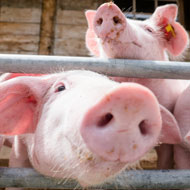Geneticist launches new pig management consultancy

The new consultancy will offer a range of efficiency-enhancing services to pig producers both in the UK and overseas.
A new genetic and pig management consultancy has launched in East Yorkshire to provide a range of efficiency-enhancing services to pig producers both in the UK and overseas.
The aim of the company, Data to Decisions Ltd, is to assist with recording, retrieving, interpreting, and managing data for both commercial and pedigree breeders to ensure herds are well managed for optimum performance.
A key component of the service is PigCom - an electronic recording service which analyses production data and presents it in an understandable format.
The service enables trends in key performance indicators, such as changes in farrowing rate, to be identifies to allow informed management decision-making. It also helps producers evaluate breeding stock from different sources or changes to service routines during on-farm trials.
The consultancy is owned by geneticist Ed Sutcliffe said, who gained an MSc in animal breeding with distinction at Edinburgh University.
Commenting on his unique mix of skills, Ed said: “There are people working in software development who have a background in animal breeding/genetics and developers who have practical pig knowledge but few have all three.
“Herd owners – and their advisers – need to know what is actually happening, rather than what they think is happening, and identify trends to make effective decisions. This means having robust data in a format which lends itself to analysis and the ability to interrogate data to improve herd performance and profitability.
"In conjunction to genetic improvement companies, many large commercial herds breed their own replacements and need to manage their data and genetic resources proficiently."
The company already provides services to herds in Asia and the European mainland.



 HMRC has invited feedback to its communications regarding the employment status of locum vets and vet nurses.
HMRC has invited feedback to its communications regarding the employment status of locum vets and vet nurses.